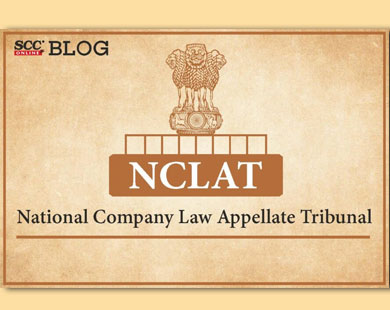National Company Law Appellate Tribunal, New Delhi: A bench consisting of Anant Bijay Singh, J., and Shreesha Merla* (Technical Member) held that once the Resolution Plan is submitted for approval before the Adjudicating Authority, it is binding between the Committee of Creditors (CoC) and the Successful Resolution Applicant (SRA), unless there is any material irregularity or the same is against S. 30(2) of the Insolvency and Bankruptcy Code, 2016.
Factual Matrix
In the present matter, an application was preferred by the Committee of Creditors (CoC) before the Adjudicating Authority, NCLT for approval of resolution plan. While the said application was still pending for adjudication, the CoC moved an application for consideration of a new resolution plan of a third party, HCL. The said application was allowed by the NCLT. The appellant, Kalinga Allied Industries India (P) Ltd./SRA preferred an appeal under S. 61 IBC challenging the impugned order dated 26-07-2021 passed by the NCLT.
Moot Point
Whether CoC after having approved a Resolution Plan can seek direction to consider a new Resolution Plan of a third party who was not a part of the CIRP Proceedings, and seek to withdraw their approval after more than 2 years of the approval of the first Resolution Plan?
Appellant’s Contentions
The appellant contended that contended that NCLT cannot entertain an application of the third party if that party has not participated in the CIRP. The appellant contented that the Resolution Plan approved by the CoC is a ‘Contract’ and becomes binding between the CoC and the appellant and the approval of the Resolution Plan cannot be withdrawn as more than three years has already lapsed. Moreover, CoC cannot bypass this Tribunal’s order dated 11-01-2021.
Respondent’s Contentions
Relying on Siva Rama Krishna Prasad v. S. Rajendran, Comp. App. (AT) (Ins.) No. 751/2020 and Gulabchand Jain v. Ramchandra D. Choudhary, Comp. App. (AT) (Ins.) No. 142/2021, the respondent contended that CoC can withdraw and recall its consent given to a Resolution Plan prior to the approval by the NCLT.
The respondent relied on K. Sashidhar v. Indian Overseas Bank, (2019) 12 SCC 150, Committee of Creditors of Essar Steel India Ltd. v. Satish Kumar Gupta, (2020) 8 SCC 531 and Kalpraj Dharmashi v. Kotak Investment Advisors Ltd., 2021 SCC OnLine SC 204, and contended that it is in the domain of the CoC to decide which Resolution Plan is more suitable and commercial wisdom of Coc is non-justiciable. The respondent further contended that keeping in mind the object of IBC i.e., ‘Maximisation of Value of Assets’, the CoC has considered a Plan of a third party who has offered higher amount.
The respondent stated that even after giving several chances to the appellant to provide clarification regarding the Resolution Plan, the appellant offered a Resolution Plan which was non-compliant with the provisions of IBC therefore the same was not put up by the Corporate Debtor to the CoC for approval.
Tribunal’s Observation
The Tribunal observed that vide order dated 11-01-2021, this Tribunal directed that no new application ought to be entertained if a person has not participated in the CIRP and since the said order was never challenged by CoC, therefore, the said order has attained finality.
The Tribunal observed that in several judgements the Supreme Court has held that the jurisdiction of the Tribunal is limited as far as the Commercial Wisdom of the CoC is concerned unless and until there is any material irregularity or is against the provisions of Sections 30(2) of the Code, but the moot point in the present case is not related to Commercial Wisdom of CoC.
The Tribunal placed reliance on Ebix Singapore (P) Ltd. v. Committee of Creditors of Educomp Solutions Ltd., 2021 SCC OnLine SC 707 where it was held that “A submitted Resolution Plan is binding and irrevocable as between the CoC and the successful Resolution Applicant in terms of the provisions of the IBC and the CIRP Regulations.”, and “*the NCLT cannot do what the IBC consciously did not provide it the power to do”.
Relying on Ebix Singapore (Supra), where the Supreme Court observed that strict timelines have to be adhered to and that the Adjudicating Authority lacks the authority to allow the withdrawal/modification of the Resolution Plan by an SRA, as this would defeat the very objective of the statute, the Tribunal opined that seeking withdrawal of an already approved Resolution Plan by the CoC would only lead to further delay and defeat the very scope and objective of IBC by restarting the CIRP Process from the valuation stage when all the statutory timelines have long since been exhausted. The Tribunal stated
“The existing framework does not provide any scope for effecting any further modifications or withdrawals of the CoC approved Resolution Plan by the SRA or the Creditors. The Adjudicating Authority can interfere only if the Plan is against the provisions of the Code. Once the Plan is submitted to the Adjudicating Authority, it is binding and irrevocable as between the CoC and the SRA in terms of the provisions of the Code.”
Tribunal’s Decision
Setting aside the impugned order of NCLT, the Tribunal held that once the Resolution Plan is submitted for approval before the NCLT, it is binding between the CoC and the SRA, unless there is any material irregularity or the same is against the provisions of S. 30(2) IBC. Thus, NCLT having limited jurisdiction i.e., residuary jurisdiction cannot interfere in the said process.
[Kalinga Allied Industries India (P) Ltd. v. CoC (Bindals Sponnge Industries Ltd.), 2022 SCC OnLine NCLAT 1618, decided on 19-12-2022]
*Judgment by Ms. Shreesha Merla.
Advocates who appeared in this case:
Mr. Abhijeet Sinha and Mr. Rakesh Wadhwa, Counsel for the Appellant;
Mr. Mohit Nandani, Counsel for the Respondent No. 1;
Mr. Mukesh Kumar, Counsel for the Respondent No. 2.
*Ritu Singh, Editorial Assistant has put this report together.







